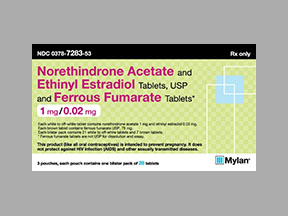
Microgestin Fe 1/20 Coupons & Savings Card – Discount Prices from $17.49
Brand for: Norethin ace-eth estrad-fe
This combination hormone medication is used to prevent pregnancy. It contains 2 hormones: norethindrone (a progestin) and ethinyl estradiol (an estrogen). There is a small amount of iron (ferrous fumarate) in each of the 7 inactive tablets taken during the fourth week. The inactive pills do not contain any hormones. These tablets are meant to keep you in the habit of taking 1 tablet each day and do not have enough iron to treat iron deficiency. Besides preventing pregnancy, birth control pills may make your periods more regular, decrease blood loss and painful periods, decrease your risk of ovarian cysts, and also treat acne. This medication does not protect against sexually transmitted diseases (such as HIV, hepatitis B, gonorrhea, syphilis). Using an effective barrier method (latex or polyurethane condom/dental dams) during sexual activity will help to decrease your risk of infection.
Our Microgestin Fe 1/20 coupons are free to use. You can print the coupon, email it to yourself, or receive the Microgestin Fe 1/20 coupon via text message. To get your free discount, show the pharmacist your Microgestin Fe 1/20 savings card which has the discounted coupon price. Use our filters below to edit the prescription box to match your needs. The Microgestin Fe 1/20 prices will update based on your prescription needs. Above our Microgestin Fe 1/20 coupons, you can change the location to see pharmacy prices in other areas. Our prescription discount card will update online with the specific pharmacy costs associated with your edits. Be sure to text, email, or print the Microgestin Fe 1/20 savings card code that you need after editing the prescription box and location field. Show the discount card to your pharmacist before paying.
My prescription
Edit
1-20MG-MCG, Norethin Ace-eth Estrad-fe (84 Tablets)
Select pharmacy

CVS
$33.94
COUPON PRICE
Walgreens
$17.49
COUPON PRICE
Walmart
$23.36
COUPON PRICE
Albertsons
$26.40
COUPON PRICEMicrogestin Fe 1/20 savings card
Show this card to your pharmacist
Walgreens
$17.49
BIN
ID
PCN
GRP
015995
LHKPY247038
GDC
DR33
Powered by
This combination hormone medication is used to prevent pregnancy. It contains 2 hormones: norethindrone (a progestin) and ethinyl estradiol (an estrogen). There is a small amount of iron (ferrous fumarate) in each of the 7 inactive tablets taken during the fourth week. The inactive pills do not contain any hormones. These tablets are meant to keep you in the habit of taking 1 tablet each day and do not have enough iron to treat iron deficiency. Besides preventing pregnancy, birth control pills may make your periods more regular, decrease blood loss and painful periods, decrease your risk of ovarian cysts, and also treat acne. This medication does not protect against sexually transmitted diseases (such as HIV, hepatitis B, gonorrhea, syphilis). Using an effective barrier method (latex or polyurethane condom/dental dams) during sexual activity will help to decrease your risk of infection.
Our Microgestin Fe 1/20 coupons are free to use. You can print the coupon, email it to yourself, or receive the Microgestin Fe 1/20 coupon via text message. To get your free discount, show the pharmacist your Microgestin Fe 1/20 savings card which has the discounted coupon price. Use our filters below to edit the prescription box to match your needs. The Microgestin Fe 1/20 prices will update based on your prescription needs. Above our Microgestin Fe 1/20 coupons, you can change the location to see pharmacy prices in other areas. Our prescription discount card will update online with the specific pharmacy costs associated with your edits. Be sure to text, email, or print the Microgestin Fe 1/20 savings card code that you need after editing the prescription box and location field. Show the discount card to your pharmacist before paying.
Microgestin Fe 1/20 FAQs
Using the SaveHealth discount card, what is the price of Microgestin Fe 1/20 without insurance?
Using the SaveHealth discount card, the price of Microgestin Fe 1/20 without insurance is $17.49.
What is the price of Microgestin Fe 1/20 at CVS?
The price of Microgestin Fe 1/20 at CVS is $33.94.
What is the price of Microgestin Fe 1/20 at Walgreens?
The price of Microgestin Fe 1/20 at Walgreens is $17.49.
What is the price of Microgestin Fe 1/20 at Walmart?
The price of Microgestin Fe 1/20 at Walmart is $23.36.
